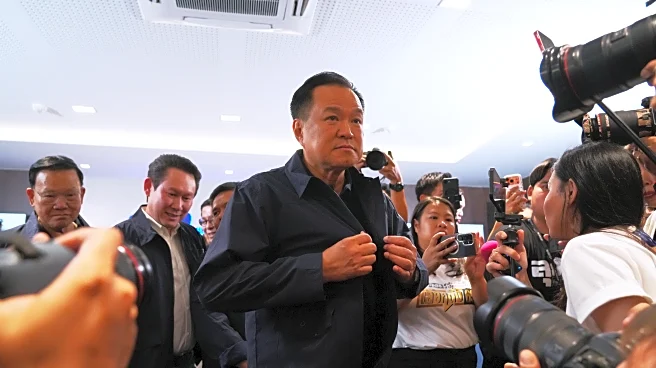What's Happening?
Keanu Reeves has expressed concern over the use of AI deepfakes that impersonate him to sell products without his consent. Reeves, who is often targeted due to his lack of social media presence, pays a company to issue takedowns of fake accounts and images. He described the experience as unsettling, noting the loss of personal agency and the potential for scams. Reeves joins other celebrities, such as Tom Hanks and Morgan Freeman, in highlighting the issue of unauthorized AI-generated content. The actor has previously spoken about the dangers of deepfakes and the need for regulations to protect individuals from misuse.
Why It's Important?
The proliferation of AI deepfakes poses significant challenges to privacy and authenticity in the digital age. Reeves' concerns underscore the need for regulatory frameworks to address the ethical implications of AI technology. The ability to create convincing fake images and videos raises questions about consent, identity theft, and the potential for misinformation. As AI technology advances, the entertainment industry and society at large must grapple with the balance between innovation and protection of individual rights. Reeves' advocacy for regulation highlights the importance of safeguarding personal likenesses and maintaining trust in digital content.
What's Next?
Reeves' call for regulation may prompt discussions among policymakers and industry leaders about the development of guidelines to address AI deepfakes. The entertainment industry could see increased efforts to protect actors' likenesses and prevent unauthorized use. As awareness of the issue grows, stakeholders may collaborate to establish standards for AI-generated content and explore technological solutions to detect and mitigate deepfakes. Reeves' involvement in the conversation may influence public perception and drive momentum for change.
Beyond the Headlines
The issue of AI deepfakes extends beyond the entertainment industry, touching on broader themes of privacy, security, and digital ethics. The ability to manipulate images and videos challenges traditional notions of authenticity and raises concerns about the potential for exploitation. Reeves' experience highlights the cultural and sociological impacts of AI technology, prompting discussions about the role of technology in shaping human behavior and the importance of ethical considerations in innovation.










